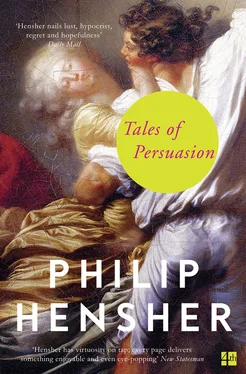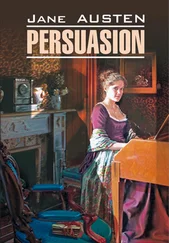Philip Hensher - Tales of Persuasion
Здесь есть возможность читать онлайн «Philip Hensher - Tales of Persuasion» — ознакомительный отрывок электронной книги совершенно бесплатно, а после прочтения отрывка купить полную версию. В некоторых случаях можно слушать аудио, скачать через торрент в формате fb2 и присутствует краткое содержание. Жанр: unrecognised, на английском языке. Описание произведения, (предисловие) а так же отзывы посетителей доступны на портале библиотеки ЛибКат.
- Название:Tales of Persuasion
- Автор:
- Жанр:
- Год:неизвестен
- ISBN:нет данных
- Рейтинг книги:4 / 5. Голосов: 1
-
Избранное:Добавить в избранное
- Отзывы:
-
Ваша оценка:
- 80
- 1
- 2
- 3
- 4
- 5
Tales of Persuasion: краткое содержание, описание и аннотация
Предлагаем к чтению аннотацию, описание, краткое содержание или предисловие (зависит от того, что написал сам автор книги «Tales of Persuasion»). Если вы не нашли необходимую информацию о книге — напишите в комментариях, мы постараемся отыскать её.
Tales of Persuasion — читать онлайн ознакомительный отрывок
Ниже представлен текст книги, разбитый по страницам. Система сохранения места последней прочитанной страницы, позволяет с удобством читать онлайн бесплатно книгу «Tales of Persuasion», без необходимости каждый раз заново искать на чём Вы остановились. Поставьте закладку, и сможете в любой момент перейти на страницу, на которой закончили чтение.
Интервал:
Закладка:
‘That was Patrick,’ the woman said, coming out of the office with a dark blue document clutched to her bosom. ‘What are you doing down there? Come back and sit down with your aunty Andrea. She’ll tell you what’s what. You’ll never guess. Patrick’s calling from the phone box at the top of Whitehall. He says— Well, did you hear that bang?’
‘No,’ George said. ‘What bang was that?’
‘That bang!’ Andrea said. ‘Half an hour ago, that bang. I wondered what it was so I went down and asked the front desk, they didn’t know any more than I did. What bang, he says. It made me jump, I can tell you.’
There was a pause. Andrea was inspecting him in close detail, standing with her legs apart.
‘Well, we can’t have you standing in the corridor all day,’ she said. ‘I expect I’d better show you where your office is, and you can make yourself at home. It’ll be funny not having Mike in there. Ah, well.’ She sighed theatrically. ‘Now, these are my keys. I’ve got a set for everyone’s office. Don’t waste your time asking me if you can borrow them when you forget yours – ooh, Andrea, pretty please, it’ll only be this once, I’ve never forgotten them before. I’ve got a good reply to that sort of thing. No. Way. Sunshine. Because there’s no way I let them, my keys, I mean, out of my possession. So you’ve just got to hang on to yours. Welsh, are you?’
George’s office was quite bare: there was a desk facing the door, an empty bookcase, and nothing more but a desk tidy, and a pair of plastic trays, one labelled IN and the other labelled OUT. There was a pile of papers in the in-tray. There was a large, grubby white telephone on the desk, and a spiral-bound notebook with a chewed biro alongside. Everything was generic, except one thing: a miniature object, a range of five furled flags the size of a stretched hand. There had been a previous inhabitant of this office, who now had moved out and left this. At some point George was going to meet that previous inhabitant; at some point he, too, was going to leave some individual sign of his life for a new boy, a new girl, to wonder about. In two years’ time, perhaps.
Andrea had gone back to her office, closing the door, without waiting for a response to her question. A red light on the telephone showed that she had started a call. George hung his coat on the back of the door, and put his empty briefcase down by the side of the desk. His father’s professional life must have started exactly like this, thirty-five years ago. He had arrived in the office where he would spend the rest of his working life, moving from job to job, but always remaining loyal to the organization. George’s life had led up to this moment, and he would never be unemployed or unattached again. The years at university, trying to get an essay exactly right, trying to fish a piece of overlooked information from the seas of the Bodleian had led up to this moment, with an empty desk and a tray full of stern, detailed information.
He had taken two days off from the language school in October to undertake the application process. He had filled in forms, and drafted polite letters to imaginary supplicants who were attempting to defraud the public purse; he had entered into discussion with other applicants and with the examiners; and he had been interviewed. The rooms in which the process had taken place were bright-lit and yellowish. Each of them had windows, which, like this one, were veiled by net curtains too long for the space. A middle-aged woman with a mop of ginger hair and an amber brooch on a green sweater had introduced herself as the psychologist on the team. She had asked him penetrating and quite personal questions until one question – George could not recall what the question had been – had made him reply that he didn’t believe the answer was any of her business. The interview had come to an end promptly after that. At the time, George had wondered whether he had scuppered his chances by being rude. Afterwards, when the offer of a job came, it seemed to him that he had been firm and impressive in drawing a line. So he was in his office, not yet with his name on the door, preparing to start work.
Elsewhere in the city, Londoners were setting to work, exchanging insults and flirtatious suggestions with their colleagues, having a cup of coffee, getting down to their most ordinary business. To kick your shoes off under your desk, to hang your jacket up and straighten the photograph of your family in front of you. They would be taking it all for granted. They did not know how magical it was to have a job; only George, on his first day, knew that. In a moment, it occurred to him that he was being paid for what he was doing, even now. The thought made him dizzy.
He had been in only two or three rooms in the public service, and before, he had thought that the net curtains hanging over the windows were a matter of personal idiosyncrasy by the inhabitants or users of the rooms. Now he understood that it must have been a decision made by some central authority. He got up and examined the net curtains. They did not hang loose, but fell to a gathering pile on the windowsill. The hems of the net curtains held small lead weights, to hold the curtain down in any breeze. He picked them up; felt them in his hand. The window did not have any kind of view. It gave onto a well between buildings, and faced a high wall with yellow and brown glazed brick, broken by a single brightly lit window. It appeared to be a window on a stair or a communal space. Snow was falling thickly through the artificial light.
‘You’ll be wanting to get on with that,’ Andrea said, leaning against the doorpost. She held a blue printed report, the size of A4. ‘The dreaded in-tray. There’s always more to be getting on with. One word of warning – Patrick’s quite nice but he’s a devil for punctuality. He doesn’t like it if there’s something sitting in your in-tray that he’s waiting for and he’s still waiting for it tomorrow or, God forbid, the day after. Another word of warning – if Patrick starts gently suggesting that perhaps we could make a start on work before ten, start coming in by nine thirty or nine, just agree and come in at ten anyway. He’s hopeless about all of that, coming in early – he’s not another Chris Leonard, if you know who that was, which you don’t, I don’t suppose. Don’t be taken in by that demeanour, he’s very strict about most things. I had an aunt who was Welsh, not blood, of course, she was my uncle Edward’s second wife. Ooh, she was a bully. She sent him out to fetch her little things, all her errands, in all weathers right to the end of his life and her twenty years younger than him. He was an old fool, we always used to say, my mum whose brother she was. I don’t know why, but I’ve never managed to fancy the Welsh since then, all because of my uncle’s second wife, Phyl. Strange, isn’t it? And speak of the devil!’
In the corridor, behind Andrea, was a thin man with grey hair flopping over a drained white face, both middle-aged and boyish; he grinned forcefully, brushing the snow from his shoulders. ‘What a day,’ he said. ‘What a day. So you must be George! Welcome, welcome, welcome. I should have been here to welcome you. But Andrea was here, I’m sure. How are you, my sweet?’
‘Don’t think you can get around me as easily as all that,’ Andrea said.
‘There’s the most extraordinary thing,’ Patrick said – he must be Patrick. ‘Out there, the whole of Whitehall’s been closed off. Did you see? There’s been some kind of mortar attack on 10 Downing Street. I’m amazed you got through. A very, very good start, George! You succeeded in getting through the mass of police cordons and security walls. Most people would have given up and gone home and started work tomorrow. But not George! A big gold star on your first day, George. I really doubted I was going to make it. Did you not hear anything going off?’
Читать дальшеИнтервал:
Закладка:
Похожие книги на «Tales of Persuasion»
Представляем Вашему вниманию похожие книги на «Tales of Persuasion» списком для выбора. Мы отобрали схожую по названию и смыслу литературу в надежде предоставить читателям больше вариантов отыскать новые, интересные, ещё непрочитанные произведения.
Обсуждение, отзывы о книге «Tales of Persuasion» и просто собственные мнения читателей. Оставьте ваши комментарии, напишите, что Вы думаете о произведении, его смысле или главных героях. Укажите что конкретно понравилось, а что нет, и почему Вы так считаете.












